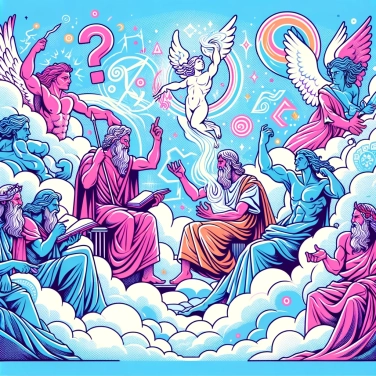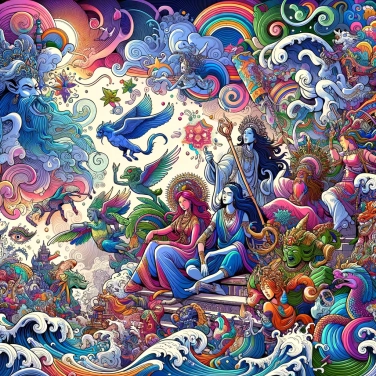Ancient Greeks created myths about gods and heroes to explain natural phenomena, transmit moral values, and give meaning to human existence.

Faced with the mysteries of the world, the ancient Greeks imagined myths to understand what eluded them. They associated natural phenomena with the actions of powerful and unpredictable deities. For example, lightning and storms were attributed to the anger of Zeus, while earthquakes were explained by the wrath of Poseidon. Similarly, the seasons were simply explained through the story of Persephone, captured in the Underworld, whose absence saddened her mother Demeter, the goddess of agriculture. Through these tales, nature became understandable and familiar. These legends provided the Greeks with a vivid way to explain and accept the unknown.
Through their stories of heroes and gods, the Greeks primarily conveyed ideas about good and evil, courage, and honor. For example, the generosity of a hero like Prometheus illustrates the importance of sacrifice to help others. In contrast, the myth of Icarus, who flies too close to the sun despite his father's warnings, serves as a reminder that pride and disobedience can lead to downfall. Through these narratives, the Greeks provided clear guidelines on how to behave (or not behave!) in everyday life, reinforcing important social and moral norms for their society.
In ancient Greece, myths created a true sense of community. Telling the same stories and honoring the same deities together gave rise to a shared identity. Each city had its own preference for a particular hero or god, like Athens with Athena or Sparta with Ares, which allowed them to strengthen their internal bonds. Great tales, such as that of the Trojan War, gave the impression of belonging to a rich and homogeneous culture, despite regional differences. These myths were recounted during religious or theatrical festivals, key moments for gathering, sharing, and proudly asserting that they were Greek.
In ancient Greece, myths often served to show that the social order was willed by the gods. For example, kings or nobles claimed to descend directly from heroes or deities, like the Atrides in Mycenae who asserted they came from Zeus. This helped to justify their authority: it is difficult to contest someone who has a god in their family tree! Similarly, legends highlighted heroic qualities such as bravery or wisdom, thereby suggesting that these virtues justified certain high positions in society. These narratives also served to keep everyone in their place by providing a sacred justification for the different social classes, the roles of each individual, and the power of a few over the many.
Ancient Greeks loved to tell thrilling stories, full of twists and spectacular adventures, which they joyfully shared during festivals or public gatherings. These myths were their own Netflix series: bold heroes, vengeful gods, fearsome monsters—everything was there to keep the audience on the edge of their seats. People cheered at the exploits of Heracles, shivered at the mention of the terrible Minotaur, and were captivated by epic journeys like that of Ulysses in his endless voyage. These tales entertained as much as they sparked the imagination, inspiring both artists and ordinary citizens, encouraging people to push their own limits or simply to dream a little.
Did you know that Greek myths were often recited or sung during public festivals like the Panathenaea in Athens, thus playing a central role in Greek popular culture?
Did you know that Homer, the supposed author of the Iliad and the Odyssey, was blind according to tradition? Yet, his works are among the most detailed and vivid of ancient Greece.
Did you know that many Greek heroes, such as Hercules or Perseus, often have one divine parent and one mortal parent, symbolizing the union between the divine world and that of humans?
Did you know that the term 'myth' comes from the ancient Greek 'mythos,' which simply means 'narrative' or 'story'? Originally, it had no connotation of a fictional or legendary tale.
Yes, the gods were considered immortal and possessing divine powers, while heroes were mortal characters with exceptional qualities or who had accomplished remarkable feats. Despite their mortality, heroes were often revered, even worshipped after their death.
Among the most influential authors are Homer, who wrote 'The Iliad' and 'The Odyssey', Hesiod, the author of 'Theogony', and playwrights such as Sophocles, Euripides, and Aeschylus, whose tragedies have greatly shaped our understanding of Greek mythology today.
Absolutely. Greek myths continue to profoundly influence literature, art, philosophy, and even modern popular culture. Many concepts, symbols, and characters from Greek mythology still regularly appear in various media and contemporary social discourse.
The ancient Greeks often viewed their myths as symbolic and instructive narratives. While some took certain aspects literally, many interpreted these stories as ways to understand the world, human morality, and their own cultural traditions.
Each ancient culture shaped its mythology according to its specific cultural and geographical context. Greek mythology stands out particularly for its abundance of complex narratives rich in moral allegories, its highly humanized characters with pronounced emotions and flaws, and its significant influence on the arts and Western thought thereafter.

100% of respondents passed this quiz completely!
Question 1/5